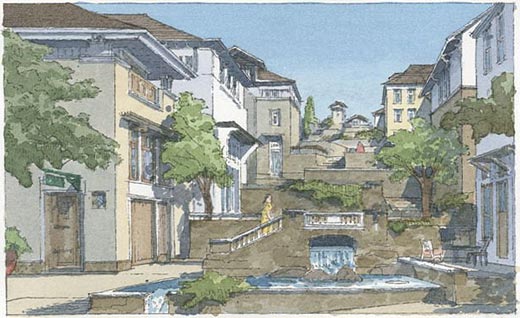
JANUARY-FEBRUARY 2007
Flavoring Fayetteville
Three Arkansas new urban converts bring the taste of good urbanism to the South.
They may not have a company name, but a trinity of Arkansas new urbanists is preaching the gospel of traditional neighbor hood development like a three-headed evangelistic minister set loose on Razorback Country with a mission from above.
Ward Davis, Morgan Hooker and Dirk Van Veen are fighting the evils of sprawl on a frontier barely 20 miles from the head quarters of Goliath Wal-Mart itself. Dial up the three developers, and you're more likely to hear them fawn over the homespun beauty of a Northwest Arkansas sunset than a corporate rollout of traditional development packaged like warehouse merchandise.
 Ruskin Hill: Proposed hillside homes and terraced pedestrian passages progressing up the slope. Image by Duany Plater Zyberk and Company. |
The minds behind Ruskin Heights -- a 29-acre Fayetteville, Ark., development named for British social, art and architecture critic John Ruskin -- are true believers. "I would say as a whole, we've admired urban principles. I was a hard convert and now just can't see any other way to do it," says Van Veen, a 37-year-old entrepreneur who created and still owns three successful companies. "TND, it's harder and an uphill battle. It's harder to get approval, but it's definitely more satisfying."
Hooker, also 37, worked as a builder and for a developer. "I've always been an architecture freak," he says. "I've done everything from renovating homes to building five-star buildings to urban sprawl, unfortunately. Ruskin Heights is a chance to do things right."
"For a town of the size we have here, the University of Arkansas has an unbelievable transit system," he said of the 15,000-student institution that sets the tone for a city of fewer than 70,000 residents. "We have worked very hard to locate a [transit] node right at Ruskin Heights because we knew we'd have the density and the connectivity."
The Ruskin Heights group also includes Mitchell Massey, a financial partner who was the majority partner of The Growth Group, a large developer that does both traditional and conventional development in the rapidly growing, 450,000 population Fayetteville Metropolitan Statistical Area. The Ruskin triumvirate is a bit of a spin-off of The Growth Group.
Davis, a 34-year-old investment banker, calls his group the "anti-developer," saying the trio is moving more methodically than the typical quick-in, quick-out conventional developer. "There has never been an avenue for doing [new urbanism] in Fayetteville until this," he says. "This land has great topography and it's in the best location for suburban infill -- it's directly in between high-end suburban neighborhoods and the downtown."
Ruskin Heights is rather dense for an area accustomed to large-lot suburbia. Plans call for 295 residential units on land previously occupied by only four houses. The development also will be diverse and mixed, with 40 percent single-family detached houses, 30 percent condo lofts and 30 percent live/works and townhomes. Ruskin also will feature 60,000 square feet of retail, with some of the condos located on top of the commercial spaces.
The Fayetteville Three are quick to give credit to a host of pioneering new urbanists, including the firm of Dover, Kohl & Partners, which created for the city a plan that designated areas such as the Ruskin parcel for higher density, walkability, mixed-use and mass transit.
"This is the first project to fall under those guidelines. There's a lot of excitement, but also some concern [from the public]," Davis says. "The mayor has been very supportive and knowledgeable about TND and new urbanism."
Ruskin Heights is going through the regulatory process right now; its developers hope to break ground in the first quarter of 2007 for what will be a build-out over several years.
And, lest anyone take Davis, Hooker and Van Veen for the "rednecks" they good humoredly dubbed themselves during a conference call, the troika points out that Fayetteville is a far more sophisticated market than people realize.
People come from all over the country to the University of Arkansas or as vendors to Wal-Mart," Davis says. "Bentonville (home to Wal-Mart) is a chain restaurant mecca, so the people who move here miss their walkable neighborhoods. They end up living in Fayetteville for its urban feel. The historic district, one of the densest areas of Fayetteville, is the most pricey, the most treasured part."
The guys at the yet-to-be branded firm believe that translates into a healthy mar ket for Ruskin Heights. "People who move down here love the natural beauty and we can provide great neighborhoods as well," Davis says.
Hooker says Fayetteville is, like other university towns, "very artsy, very funky."
"There's a movement here to keep Fayetteville funky -- that means support your local businesses," he says. "People are looking for quality. They want well-built durability."